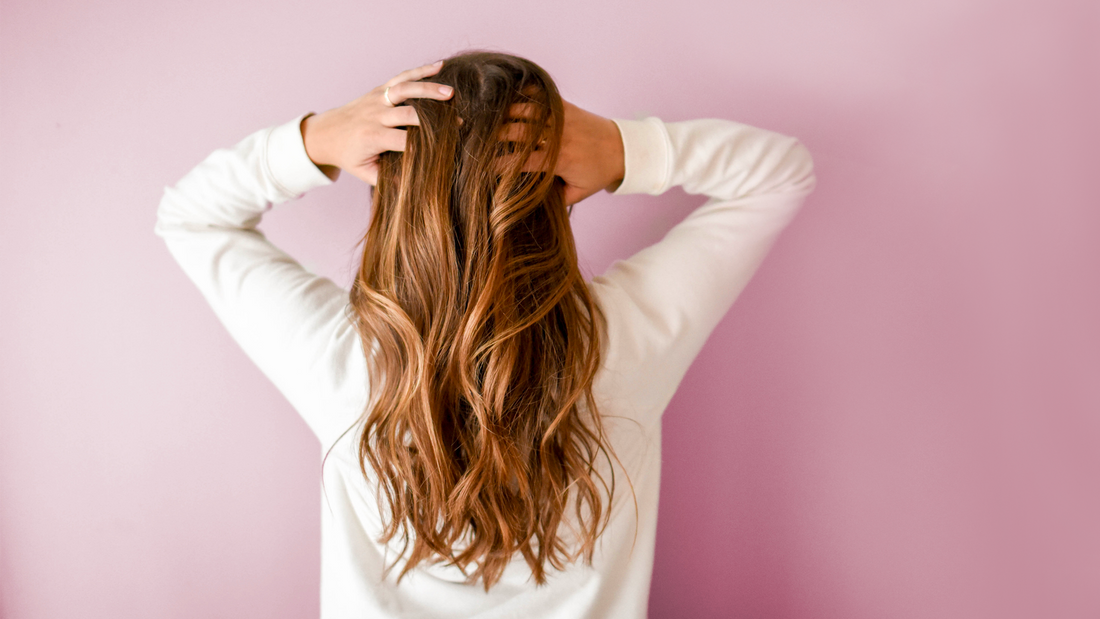Why opt for natural hair care?
Like our body and our skin, our hair and scalp face a number of aggressive factors, such as seasonal and temperature changes and environmental pollution, as well as residue build-up.

Which ingredients should be avoided in natural hair care?
Here is a brief list of ingredients used in conventional shampoos. These are often used to optimize product performance and appearance of the hair, but are best to avoid*:
-
Surfactants
Used as a washing and foaming base. For example, sodium laureth sulfate. -
Cationic surfactants
Used to detangle and condition hair and remove static electricity: For example, benzalkonium chloride and dicocodimonium chloride. -
Emulsifiers and thickeners
Added to the formulas, with emollient and softening properties: For example, silicone and polymer, including dimethicone and acrylate crosspolymer. -
Preserving and antibacterial agents
For example, parabens and their common substitutes, such as methylisothiazolinone (MIT) and methylchloroisothiazolinone (MCI), or DMDM hydantoin. -
Perfumes
Listed as Fragrance / Parfum on the label.
Regarding ATTITUDE's ingredients, the term “fragrance” refers to a mix of ingredients that will produce a characteristic smell. Our products have always contained clean, EWG VERIFIEDTM ingredients that can be part of a product's smell, such as essential oils, naturally sourced and/or natural-identical ingredients. This means that our fragrances are exact reproductions of molecules already present in nature.
A natural-identical ingredient means that out of hundred molecules in a flower for example, science allows the extraction and production of interesting molecules. Thus, it is possible to produce interesting molecules naturally found in nature. Molecules have then been chosen for its properties such as great smell.
We include the word "*fragrance (parfum)" on our packaging because it is a regulatory requirement to write down this term. Thus, the term "*perfume (fragrance)" is not a new component added to the product. Same ingredient list, just a more transparent way to show it.
For more information and to detect some ingredients in your shampoos, read our article on the subject. 
How to: 8 steps to better hair care
1. Use natural shampoos and conditioners
To condition, wash and moisturize your hair, use mild shampoos containing mineral and vegetable ingredients. Change your hair routine by adding natural shampoos to your beauty kit.
2. Limit the use of styling products
There are tons of styling products on the market: shampoos, conditioners, moisturizers, fixatives, gels and mousses. It's important to check their ingredients before using them. Some, such as hair masks, require several minutes to take effect before rinsing. You may not see any benefit if they contain any allergenic or irritating ingredients.
3. Avoid sources of heat to dry and style hair
Hair dryers, as well as flat and curling irons can be tough on hair – especially the ends. They may help us style our hair, but they can also dry out and break the ends. Like all bad habits, we know it's not good for us, but we have a hard time giving it up. Try air-drying your hair and let the braids and buns give them curl. It's a more natural look, and you won't have unruly, heat-damaged hair.
4. Moisturize your lengths
Moisturizing is essential for lengths, especially after spending a few months under a hat. Moisturizing and nourishing natural hair care products can liven up dull, dry and brittle hair and reduce split ends.

5. Not once, but twice!
Hairdressers agree that when you shampoo twice instead of once, it optimizes the product's effectiveness. A moisturizing shampoo will work better on the second application – just divide the amount of product used in half and you won't need more than usual.
6. Space your shampoos
It may not be easy, but it's really the key to natural, healthy hair! Do you wash your hair every day or every other day? Try skipping a day. Use the opportunity to try out your talents and create different hairstyles… and don't forget the hairbands. They'll be your best friends! When you wash your hair, it's best to start at the nape of the neck and massage the circumference of the face, where impurities may seep in (pollution, makeup and creams). You don't need to punish your hair with hard scrubbing. Just gently massage your scalp so the product spreads throughout the hair during rinsing.
7. Limit or space your colour
Hair colour – another enemy of your hair! Although it may be tempting when spring arrives, it's best to try and space out your colour as much as possible and opt for specialized care for coloured hair. Color Protection shampoos and conditioners, for example, naturally protect and revive hair colour. With antioxidant-containing pomegranate extracts, they help repair dull and damaged hair to give them maximum vitality. Avocado oil, rich in fatty acids, nourishes the hair, for flexibility and softness.
8. Use a bamboo hairbrush
The natural wooden bristles of bamboo brushes are less damaging to hair ends than those of plastic brushes. They also evenly distribute your hair's natural oils and reduce the static effect of scarves during cold weather.
It's best to rely on natural shampoos for beautiful healthy hair as well as peace of mind. Will you try any of these handy little tips? To help you find the ideal natural hair care routine, we’ve also created a 7-questions quiz to help you find the right products. Take the test!
Were you interested by this article? Get the word out by sharing it with your friends!
*According to EWG
